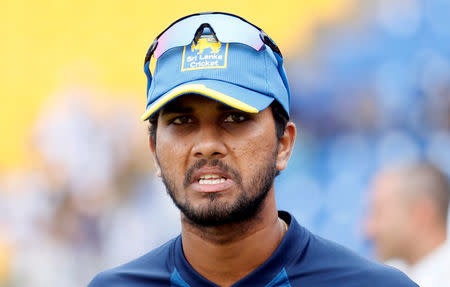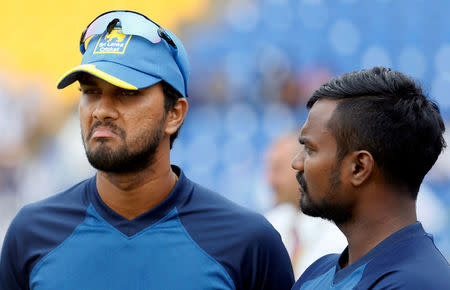Cricket - Sri Lanka transition grinds to halt at India roadblock
By Amlan Chakraborty (Reuters) - Two years have passed since Sri Lanka bid farewell to the last of their batting greats yet the South Asian side appears no nearer to ending what has been a difficult period of transition. When the brilliant Kumar Sangakkara followed the equally prolific Mahela Jayawardene into retirement in 2015, even the most optimistic Sri Lankan fans acknowledged the void they left was simply too big to be filled overnight. What they probably did not anticipate was that two years down the line, the team would still be hopelessly in the throes of a seemingly interminable era of regeneration. Once admired, even envied, for their steady supply of freak bowlers with bizarre actions and a near-invincible record at home, Sri Lanka's recent humiliating 3-0 whitewash at the hands of India made for a particularly painful watch. Only Kusal Mendis and Dimuth Karunaratne offered fleeting glimpses of batting prowess but Sri Lanka were otherwise completely outclassed by the tourists in one of the most lop-sided series of recent times. "Since I've been in this team, this is the worst series loss I've experienced," test skipper Dinesh Chandimal said after his team lost three matches in 11 days against their neighbours. The debacle followed their first ever one-day series loss to Zimbabwe in July, which prompted a frustrated Angelo Mathews to relinquish the captaincy of both the test and one-day sides. Mathews appeared to have sparked a revival last year when they whitewashed Australia but the 3-0 home win proved little more than a false dawn. Sri Lanka were subsequently thrashed in both tests and one-dayers in South Africa, lost a home test against Bangladesh and then failed to progress beyond the group stage at this year's Champions Trophy. The India whitewash has led the country's sports ministry to call for a report from Sri Lanka Cricket (SLC) to explain why the side performed so poorly, while former captain Aravinda de Silva believes the board lacks vision. "We are going through a rebuilding process but you can't be saying that forever," de Silva, hero of Sri Lanka's 1996 World Cup triumph, told the Hindu newspaper last week. "Short-term process is good for a few months, one or two series, but not for the future. "So we need to seriously look at the team in the long-term and not keep chopping and changing," said de Silva, who quit as head of the board's cricket committee in May. STRING OF INJURIES His former team mate and chief selector Sanath Jayasuriya pointed to a string of injuries as one reason for the side's struggles and dismissed allegations of leading a trigger-happy panel. "Why should we change a squad of players if they are performing well and are injury free?" he told reporters. "Do you know how many players have been injured in the last 14 months?" Asela Gunaratne missed a majority of the series after fracturing his hand on the first day of the opening test and paceman Nuwan Pradeep was sidelined after picking up a hamstring injury in the second test. Rangana Herath, who has helped Sri Lanka overcome the loss of retired spin great Muttiah Muralitharan, missed the final test with a stiff back. Sri Lanka were twice subjected to being made to follow-on and a lack of balance was evident as they failed to stretch any of the three tests to a full five days. Jayasuriya sought to explain the lack of competitiveness. "For instance, Mathews is not bowling after his hamstring injury," the former captain said of the all-rounder. "He used to bowl at least 15 overs in a test innings earlier but now plays purely as a batsman. So it's very difficult to get the right balance when your key all-rounder is not bowling." (Reporting by Amlan Chakraborty in New Delhi; Editing by John O'Brien)

 Yahoo Sport
Yahoo Sport 







































